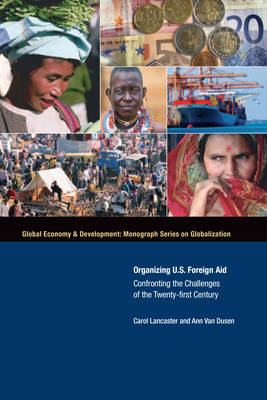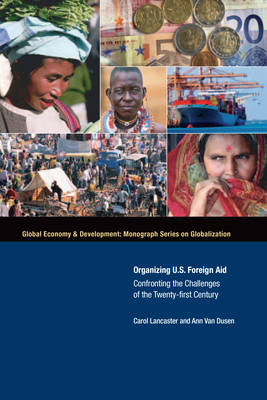
- Afhalen na 1 uur in een winkel met voorraad
- Gratis thuislevering in België vanaf € 30
- Ruim aanbod met 7 miljoen producten
- Afhalen na 1 uur in een winkel met voorraad
- Gratis thuislevering in België vanaf € 30
- Ruim aanbod met 7 miljoen producten
Organizing U.S. Foreign Aid
Confronting the Challenges of the Twenty-First Century
Carol Lancaster, Ann Van DusenOmschrijving
Overwhelmed by a proliferation of foreign aid programs, the U.S. government is attempting to reorganize itself in order to manage them more effectively. This raises several critical issues that will shape U.S. foreign aid policy for the 21st century: Should existing foreign aid agencies be combined into a cabinet-level agency, ensuring a voice for development concerns during policy discussions, or should they be placed in the State Department to strengthen their foreign policy focus? How should aid agencies manage the planning, implementation, and evaluation of their aid? Is ""managing for results"" as currently practiced appropriate for what is often a highly experimental task of bringing about beneficial changes in foreign countries? How should the U.S. government educate its citizens on the issues of foreign aid and development as expenditures rise and as the ambitious goals driving aid--including nation building--expand? In Organ izing Foreign Aid, Carol Lancaster and Ann Van Dusen call for a fundamental reorganization of U.S. aid programs. They recommend a major increase in efforts at development education. The authors also provide insights into how other donor governments have dealt with these challenges. With the future of U.S. foreign aid policy at stake, this book will be essential reading for anyone interested in development, foreign aid, and the organization of government programs in these areas.
"Specificaties
Betrokkenen
- Auteur(s):
- Uitgeverij:
Inhoud
- Aantal bladzijden:
- 92
- Taal:
- Engels
Eigenschappen
- Productcode (EAN):
- 9780815751137
- Verschijningsdatum:
- 8/07/2005
- Uitvoering:
- Paperback
- Formaat:
- Trade paperback (VS)
- Afmetingen:
- 155 mm x 221 mm
- Gewicht:
- 167 g

Alleen bij Standaard Boekhandel
Beoordelingen
We publiceren alleen reviews die voldoen aan de voorwaarden voor reviews. Bekijk onze voorwaarden voor reviews.











